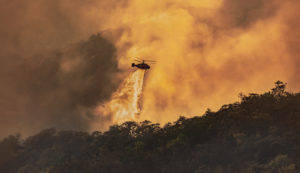6-minute read
Scientists say much of the West is experiencing its driest conditions in 1,200 years. Mind-boggling and more than mildly concerning, right? However you process it all, it’s safe to say that the dice are loaded for another big wildfire year.

What can business owners do to safeguard their businesses and property from wildfires? There are details in your coverage you’ll need to be aware of. We’ll talk about those below. But, first, here’s a checklist with six risk-control tips that will help protect you and keep the insurance company underwriters happy, especially if you’re located in a more rural area:
- Create a buffer around your building or structures. Fire and safety experts call this “defensible space.” Such a buffer between your building and the grass, trees, shrubs, or any wildland area that surround it will slow, if not stop, the spread of wildfires.
- Create and adhere to a Vegetation Maintenance Plan to reduce sources of ignition. This includes making sure you regularly prune and cut down trees in high fire-threat areas. Dead trees need to be removed entirely. Utilities do this to ensure their powerlines don’t spark wildfires in the way Pacific Gas &Electric’s lines did in Northern California several years ago. Also, make sure to select plants with low combustibility characteristics such as high moisture content, low oil or resin content, deep roots with thick heavy leaves, and minimal production of dead vegetation.
- Mulch might look nice but it isn’t your friend. Instead, use noncombustible materials for building signage, avoiding wood, plastic, and vinyl.
- Also use noncombustible material when replacing roofs. They might cost less, but structures with wood or shingle roofs are at high risk of being destroyed during a wildfire.
- Inspect vents and clear debris from roofs. Roofs and gutters are particularly vulnerable surfaces, as embers can lodge here and start a fire. Regularly clearing your roof and gutters of debris, installing gutter guards or screens, and blocking off any points of entry on your roof will all help safeguard your building.
- Take care about where you store wooden pallets, propane tanks, flammable liquids and other combustibles. Store these materials where they won’t be easy fuel for an advancing fire. If you have a multi-family business such as an apartment complex, condos, a hotel, or affordable housing, require your tenants to remove all combustible items from balconies and decks during high fire danger periods.
Business owners also need to think about what their insurance policies will – and won’t – cover in case of wildfires.
Property Insurance can be written based on either a “replacement” or “actual cash value.” The difference is huge.
While both types of coverage help with the costs of rebuilding or replacing damaged items after a covered loss, actual cash value policies are based on the items' depreciated value while replacement cost coverage does not account for depreciation. In other words, you’ll want replacement cost coverage if you expect to be paid the full replacement cost of your structure or contents.
While you’re thinking about this, also make sure the limits of coverage will allow you to replace damaged property in full. Reconstruction costs always rise with inflation and increasing property values.
New building code and environmental regulations may also increase demolition and reconstruction costs. Thus, unless your property is very new, building code upgrade coverage should be a component of your policy.
Elsewhere, check to see whether you’re covered by Business Interruption insurance.
Also known as business income insurance, BI coverage is typically available as an add-on to property and casualty insurance and is used to replace lost or reduced income or profitability after a covered loss.
The point is to help you get your business back on its feet again as quickly as possible.
BI insurance also covers the costs of a temporary relocation after a natural disaster.
While a company damaged in a wildfire is likely to temporarily layoff at least some of its employees, BI insurance also can provide continued paychecks to retain certain employees while the business is shut down.
Wildfire risk is growing, and that means more businesses will be in their path. There’s not much you can do to reduce your risk entirely. But with regular maintenance of your property and the right coverages in place, you can give your business a fighting chance the next time a wildfire sweeps through your area.
The Mahoney Group is one of the largest independent commercial insurance and employee benefits brokerages in the U.S. For more information, contact us online or call 877-440-3304.
This article is not intended to be exhaustive nor should any discussion or opinions be construed as legal advice. Readers should contact legal counsel or an insurance professional for appropriate advice.
